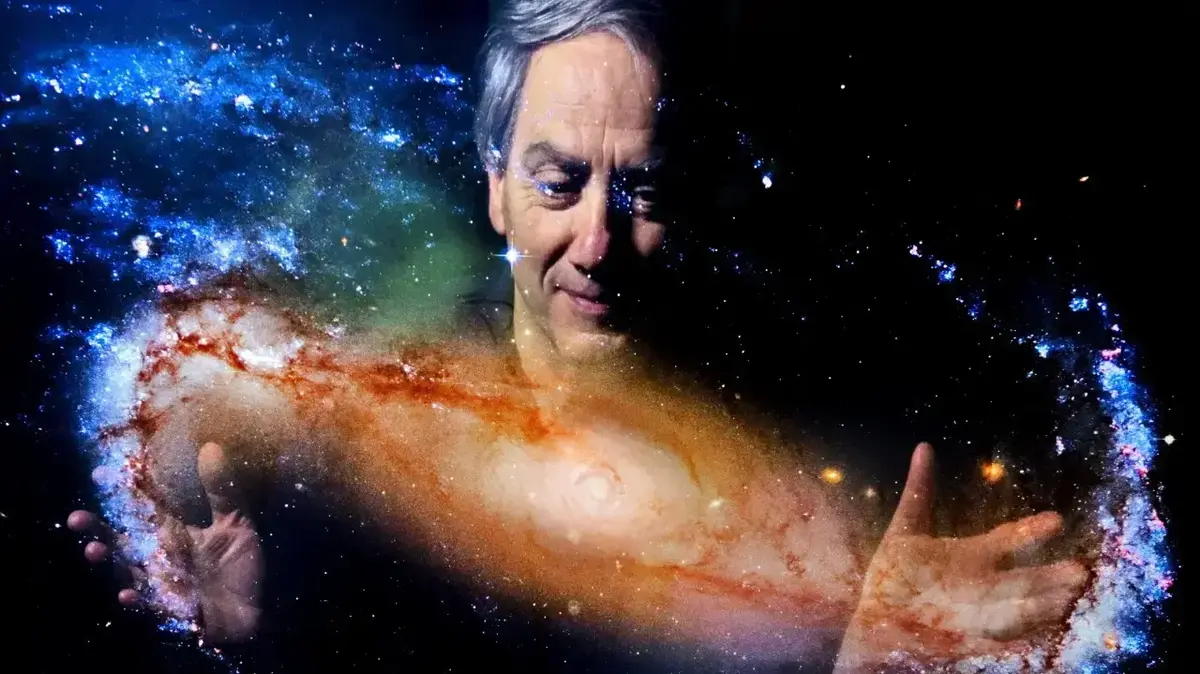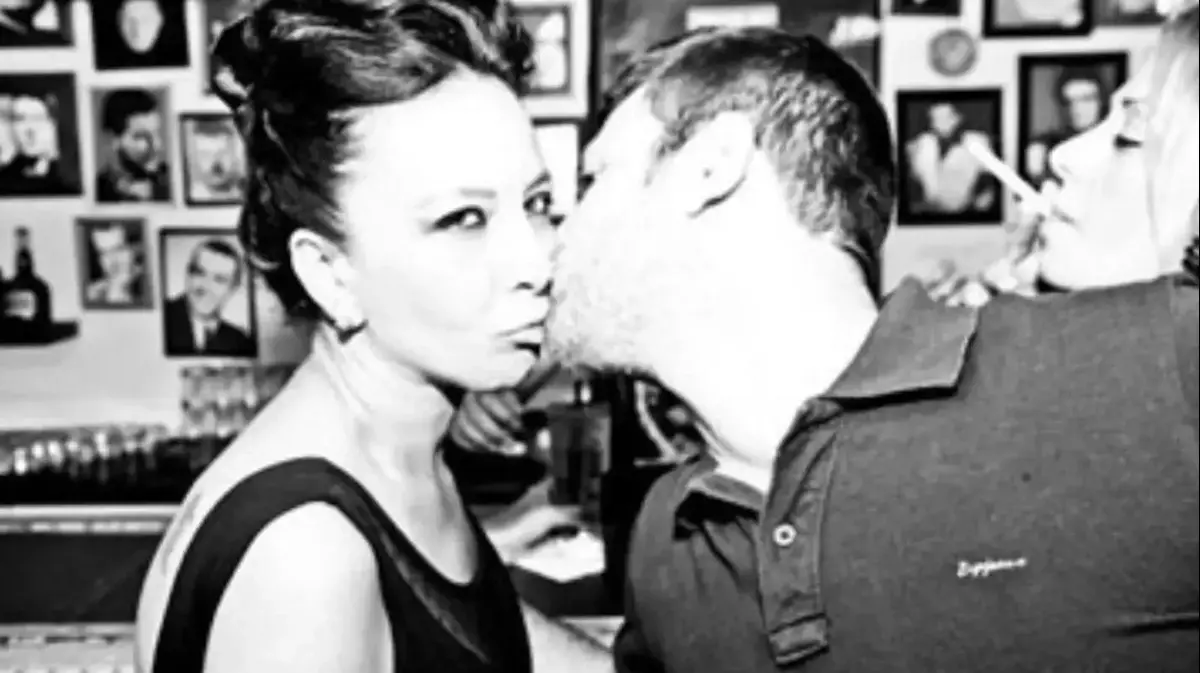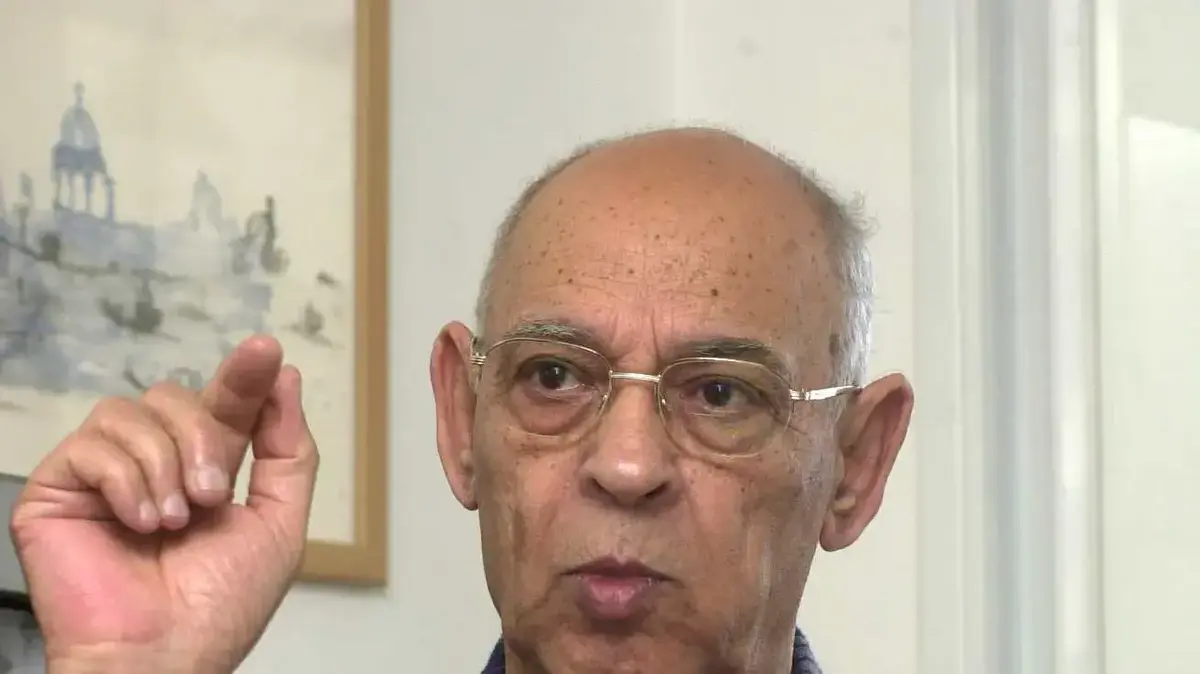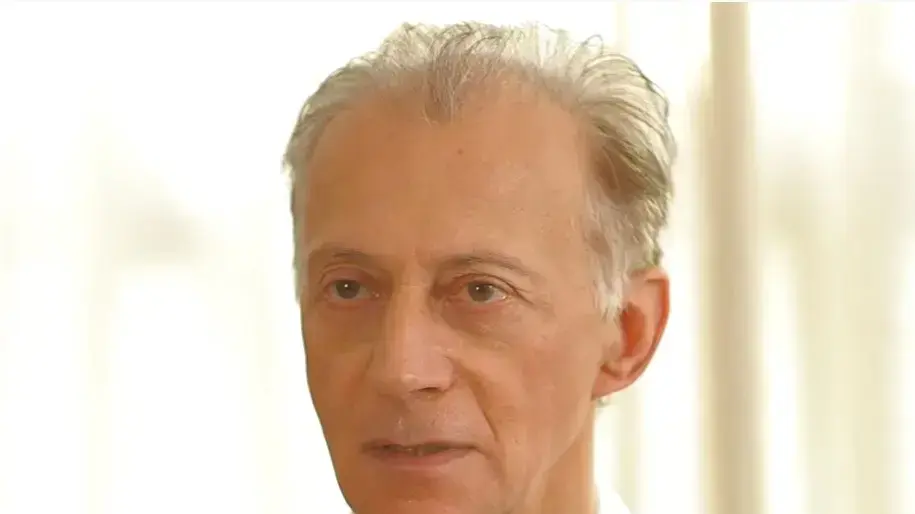culture
Digits
Writer Mario Livio against deniers: "Going against science is just crazy"
Livio's new book, "Galileo and the Deniers of Science," already betrays the mission in his name, and is greater than telling the story of the life and struggle of one of the greatest scientists in history.
In an interview with Walla!
Culture explains to Livio why it is not a good idea to go against science, and refutes some great legends about Galileo
Tags
Mario Livio
Galileo Galilei
Oren Nahari
Wednesday, 26 May 2021, 00:00 Updated: 10:25
Share on Facebook
Share on WhatsApp
Share on general
Share on general
Share on Twitter
Share on Email
0 comments
The accessibility that science allows accelerates the dissemination of incorrect information.
Mario Livio (Photo: Courtesy of the photographers)
Mario Livio: "To go against science, in fact against all the scientists involved in the subject, in the following two circumstances - when the lives of humans are in danger, which is the case in the Corona plague; or, and it is even more serious, when the whole biosphere future of our world is at stake. Humanity and life - it's just crazy "
We heard about Galileo Galilei. We vaguely know he was an important scientist. We will immediately explain how much. But what are the two things we all know about Galileo? What is he most identified with? Of course - the famous experiment in which he threw two objects of different weight from the Leaning Tower of Pisa to measure once and for all whether gravity - a concept not yet invented or thought then - works the same on all bodies or, as many have argued, a heavier weight will fall faster? And of course the intellectual, scientific truth, which he says at the end of his sentence by the Catholic Church: during which an old and sick man is forced to return from his terrible heresy, where in the mouth of a man in imaginary dialogue supports the theory of Polish astronomer Nicholas Copernicus, who argued that not the whole universe revolved Earth, except that the Earth revolves around the sun. The sublime words he declares before his judges: "And yet Noa moves!" (In the Italian original the statement is more modest - "Still it moves").
"Suri, no. It did not happen and it did not happen," Professor Mario Livio tells us, shattering two great myths, immortalized in books, paintings and countless tourist souvenirs in Pisa.
"There is excellent record of all the experiments done from the Leaning Tower of Pisa, and there is no record anywhere of this Galileo experiment. He has certainly done experiments in dropping objects, measuring the speed of fall, comparing heavier and lighter objects - but not from Pisa.
" It first appears in a book written about Galileo more than a century later, a dramatic depiction in which Galileo looks up, down, stomps his foot and proudly and loudly declares these words.
Later in the painting it is known that it was probably a forgery.
And if he did, he would be terribly punished.
And of course apart from this book there is no record of the incident.
Galileo may have said these things in his heart, he must have thought them - but he did not say them out loud.
The time for pure scientific truth in the face of fanatics has not yet come then. "
More on Walla!
Without sex, violence or cursing: writer Jeffrey Archer is surprised by his own success
To the full article
Do not believe the myths.
Galileo Galilei (Photo: image processing, public domain)
The book "Galileo and the Deniers of Science" by the Israeli-American author and astrophysicist Professor Mario Livio is currently being published in Hebrew by Aryeh Nir and Modan.
The book was originally published in the United States about a year ago, and has won much acclaim.
From the title alone it is clear that his heart has a mission, and it is greater than telling the story of the life and struggle of one of the greatest scientists in history.
Are you surprised that precisely in this period that science is so successful, predicting, healing, right now there are science deniers that are multiplying?
"I'm surprised and not surprised," Mario Livio says in a special interview with Walla! culture. "People know, on the one hand, the importance of science. Our life expectancy is twice as high as it was at the time of Galileo solely because of science. This device we all know - the cell phone, science-based - quantum theory. The GPS that allows us to orient "And he is also found in every cell phone that uses Einstein's private relativity and general relativity, and can not function without them. Even if someone thinks to himself - what about me and relativity - he should know that it helps him get to the exact place he needs. In this respect I am surprised.
" On the other hand, the same accessibility that exists today, which science allows, among other things, is also very helpful in spreading conspiracies, of lies, of political opinions against science, and this is a terrible problem. All this year, the year of the Corona, I have been bombarded with all sorts of emails from all sorts of people, even my friends: but what do you say about it being said here and there differently? ".
The book was written before the outbreak of the corona plague, and was published in March 2020 in the United States - that is, on the one hand its distribution was severely damaged, on the other hand the subject was only hotter. And in the book Livio addresses science deniers in two main areas: climate change, and Darwinian evolution.
"My point is very simple. It's never a good idea to go against science. Not that science, or the scientist, is always right. They are not - but science knows how to correct itself. To go against science, in fact against all scientists involved, in the following two circumstances - "When human lives are in danger, which is the case with the corona plague; or, and it's even worse, when the whole future of our world's biosphere is at stake, to gamble on the existence of humanity and life - it's just insane," says Livio.
"As for evolution, the opponents and deniers of evolution, who are mostly if not just religious people, proponents of creationism for example, who try to classify it as a scientific theory - it is important for me to write that it is something so central, the clash between literal interpretation of religion and science. Even Pope Francis said That evolution exists.Everyone who has seen, seen, plant culture, animals, breeding programs run by humans to make dogs stronger, horses faster - knows there is evolution. Or should know. There is a museum in Kentucky that tries to integrate science in a very touching way. And religion, when they display the box of Noah and on board, among other things, pairs of dinosaurs. "
There may well be more life in the universe.
Mario Livio (Photo: J. Coyle, Jr.)
And here we return to the book's protagonist, Galileo. One of Livio's own heroes - and this is understandable: Mario Livio is a renowned astrophysicist, who led the scientific research of the Hubble Project, a galaxy researcher. And Galileo in some ways is the first astrophysicist. He is also one of the best known victims of the struggle between science and its deniers. His trial in the short run was the church's victory over science - and in the long run a terrible discrimination for the church.
"Why another book about Galileo? Some reasons," said Livio - a scientist who believes in numbers himself, not to mention: "Because I am an astrophysicist and one of the founders of the field. Another serious reason is that all the books about him were written by historians of science and not active scientists, and I wanted to put his discoveries in the context of current knowledge. And one last reason is that previous biographies are loaded, so full of details that a reasonable person would not start reading, I felt the need to write a book Accurate, concise and concise. "
When Galileo is a candidate for church law, he is not just a person.
He is perhaps the well-known, important scientist in all of Europe.
He had reason to think that he had a defense - after all, Italy is divided between country cities, he has a defense of the Medici House, which sees the great and famous scientist as another symbol of the Medici power;
Pope Urban VIII is a personal friend of his, even a fan;
Some thugs want his favor and some even believe that he - that is, Copernicus and he - are right in the heliocentric model, while Ptolemy and the geocentric model, which puts the earth at the center of the universe, are wrong.
All this did not help him.
These were a number of factors whose combination led to his famous trial in Rome.
His venomous tongue, for example, and the enemies he acquired for him - both personal and ideological.
His attempt to walk between the drops and put the debate over the place of the earth and the sun in the form of a dialogue, in which the fool defends Ptolemy's model - that is, in projection, Galileo actually represents the pope in his own right - provoked antagonism.
And the problematic period itself - the church's struggle for reform.
More on Walla!
British author Ken Pollet: "We must finally understand that we are no longer the great power in the world"
To the full article
The hard and soft sciences need to be connected.
Mario Livio (Photo: J. Coyle, Jr.)
"Galileo was almost seventy, and he was scared," says Livio.
"He tried to evade - and he remembered well the trial and the uprising of Giordano Bruno only 33 years earlier. It is important to understand - for her the church was right. It forbade him in 1616, by a specific order addressed to him personally, to hold the Copernican opinion. He had a letter from the cardinal that put it a little weaker - and he hoped it was enough.
"But there is no struggle here between non-religion and religion: Galileo was a religious man. Everyone was then. And the ironic thing is that he is trying to save the church from himself. He knew he was right, he knew the telescope was right. He was just trying not to stop the church. Went in a field where she has no idea, where it is so clear that this mistake will be clarified, and fast.Therefore he declares that when there seems to be a contradiction between a literal interpretation of the Scriptures and what science says, a sign that our interpretation is incorrect and should be changed. True, but the interpretation is incorrect. He adds that the Bible was written to save us, for our redemption. Not as a scientific book. It did not help him, of course. And as in other organizations, it also took the church a long, very long time to admit its mistake: already in the middle of the eighteenth century, At the latest, it is quite clear that the earth orbits the sun, and yet his books remain on the forbidden list, it took another hundred years until the official announcement that Galileo was right,And it is only at the end of the twentieth century that Pope John Paul II declares in his voice that Galileo was right. "
And if anyone thinks he would stand up and tell the truth in an upright and clear manner to the Inquisition - well, no. Remember the composers, the poets, who bow their heads to Stalin, because they know the meaning of resistance, or of insufficient flattery - to them, to their families. For every Osip Mendelssohn or Chaim Lansky who has the courage to commit suicide (and who ended their lives in the Gulag), there are dozens who wanted to live, to continue to create.
The church, which tried to raise the walls against the Reformation, against the privatization of knowledge, set a divine example - and remember that according to that example a pope cannot be wrong. She could not accept that man, the God-chosen creature, the crown of creation, is not at the center of the universe, as the Scriptures suggest. The facts proved otherwise. Eventually, of course, it was - and still is - difficult to impossible for many to accept evolution. The idea that the same person, the same tiara of creation, is the product of a random evolution, of adaptation to the environment, of an asteroid that wiped out the dinosaurs for us. The subject of evolution continues to be a bitter controversy between religions and science. It just turns out that clerics are not supposed to rule on scientific laws based on religion alone. Galileo said a beautiful thing: "I do not believe that the same God who gave us the intelligence and understanding does not want us to use them."
Galileo lived to old age and return, and the glorious scientist's last years were bitter.
The man who saw farther than any man of his generation - and understood what he saw - went blind.
He was under house arrest for eight years.
His beloved daughter died (his two daughters, by the way, were Catholic nuns).
His books were confiscated.
His voice was silenced.
"In every referendum of physicists, you will ask who are the three most important of all? Galileo, Newton and Einstein will answer you (whose figure and ideas are also in the book. AN).
The order between them varies - but the most important of all.
Galileo was there not only because he did experiments - and he was an excellent experimenter - and not only because he looked at the stars in his wondrous telescope and understood what he was seeing.
He is there because he had an inconceivable brilliance: he wrote that the universe was written in the language of mathematics.
This is a tremendous breakthrough.
Up to that point the fields were separated: there was little physics, geometry, philosophy and the like.
Galileo actually begins mathematics, and says that it is the language with which we will understand the universe.
This is a breathtaking leap forward, given the period and state of knowledge, and he was absolutely right.
"And another important thing, perhaps the most important: he is one of the first to establish the scientific method. That is, how to find out what the truth is, what the facts are? Experiments and observations have to be made, they have to fit a thesis that explains them, and then a theoretical assumption is made that can test new predictions. "Sometimes the order changes - as with Einstein, who first assumes a thesis, a leap forward that is confirmed only years later."
The world is written in the language of mathematics.
Galileo Galilei and the Telescope (Photo: GettyImages, Hulton Archive / Getty Images)
In fact, Mario Livio, an astrophysicist, man of logic and equations, comes out in a book and in life against the separation between the hard and soft sciences. Between the sciences in which the equations determine everything, and literature, philosophy, the humanities; What is called in a well-known article - the two academic cultures that are receding.
"I connect them because Galileo, for example, would not understand what we were talking about. After all, he studied the humanities. He lectured on Dante (Alighieri, author of" The Divine Comedy. "AN), gave two lectures on the location and structure of hell. He was a friend of painters - among others the well-known painter Artemisia Gentilski. He compared in articles between two well-known poets of his time - Aristotle and Tasso.
"True, things have changed since then. There is a specialization. There is no need to deny it, and in this context we may not see more Renaissance people, there will no longer be Leonardo who was interested in everything. But - today we live twice as much on average, and in Galileo's time Information. Nowadays, gathering information is easy and simple and fast. There is no denying that talented people are experts in more than one field. And the thing that characterizes creative people first and foremost is that they are very, very curious. And the most creative know how to borrow ideas from one field and pass it to another. We must concentrate, as a society, only on hard science, applied science. "
And if you met Galileo, what would you tell him?
"First I would tell him - you were right," says Livio. "And second, I would show him everything we've learned since his time."
We learned, among other things, thanks to the project in which Livio worked for decades - the Hubble Space Telescope. And even today, at age 75, he continues to work at it. The knowledge from the telescope is accessible to everyone, and a theoretical astrophysicist needs, as his heart explained to me, only a computer, a pencil and paper.
Even if the myths are not true - the experiment in Pisa, "nevertheless moving" - it is impossible without them. Today the figure of the scientist who stood in front of the ecclesiastical example is actually used by the deniers of science.
"It's not true that for most of history one person has gone against the current and justice, usually the current justice," says Livio.
"Galileo is a rather isolated example of the opposite. Today, global warming deniers, corona deniers, are using what has already been called Gambit Galileo: they say that just as Galileo went against the prevailing opinion and justice, as he was the child who says the king is naked, so do they. A major failure - Galileo was not right because he went against the prevailing example - he was right because he was right. And in most cases in the case of one against all - one is wrong. This does not mean that he should be disqualified because he is one - he should be disqualified if the experiment refutes the theory. It's about one person - and whether it's all of them. "
It's never a good idea to go against science.
Mario Livio (Photo: J. Coyle, Jr.)
And in the mighty, astonishing universe, the one to which Galileo turned a telescope and made astonishing discoveries then, and mourning continues to bring us pulsating images today, are we alone? Or is there another life somewhere? Each answer by the way is frightening in its own way.
"I think there is more life in the universe. Trying not to use the word believer, but thinking," says Livio. "We mean a life similar to ours, carbon-based. And it's important to know that we do not yet fully understand the processes leading from chemistry to life. But let's look at the numbers: one in four stars in our galaxy, the Milky Way, has a possibility in principle. What does that mean? One in the so-called "golden zone" (named after gold and the three bears - i.e. a planet whose distance from the star is just right in terms of living conditions, especially temperature and running water). There are billions of such stars just for milk - and let's not forget that the Milky Way is just one galaxy - in the universe The observed has ten to the power of 12 galaxies.So yes,I think there is life there. "
And if we ever meet, the aliens and we - assuming they are intelligent, as science fiction books and movies tell us, and assuming we do not reach World War II - how do we talk?
How do we call?
Well, the assessment is that our common language will be mathematics - the one without which there is no physics, and no motion, gravity, missiles and spacecraft.
The math is valid here, at the edge of the Milky Way just like at the other end of the universe.
Just as the Italian genius Galileo Galilei predicted.
Share on Facebook
Share on WhatsApp
Share on general
Share on general
Share on Twitter
Share on Email
0 comments






/cloudfront-eu-central-1.images.arcpublishing.com/prisa/NS3ZU25XBNH4BJLTJPBCRCLEXE.jpg)


